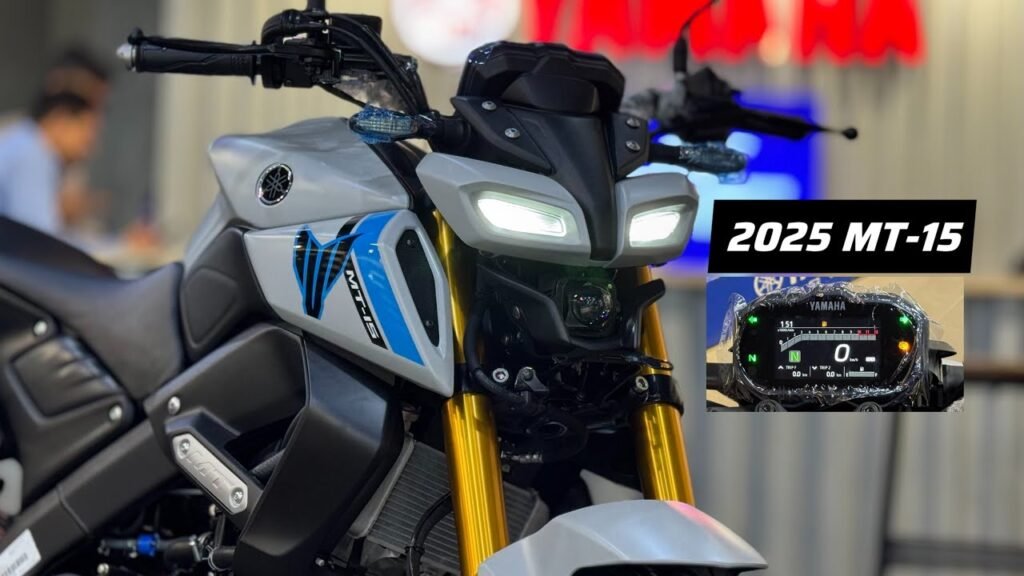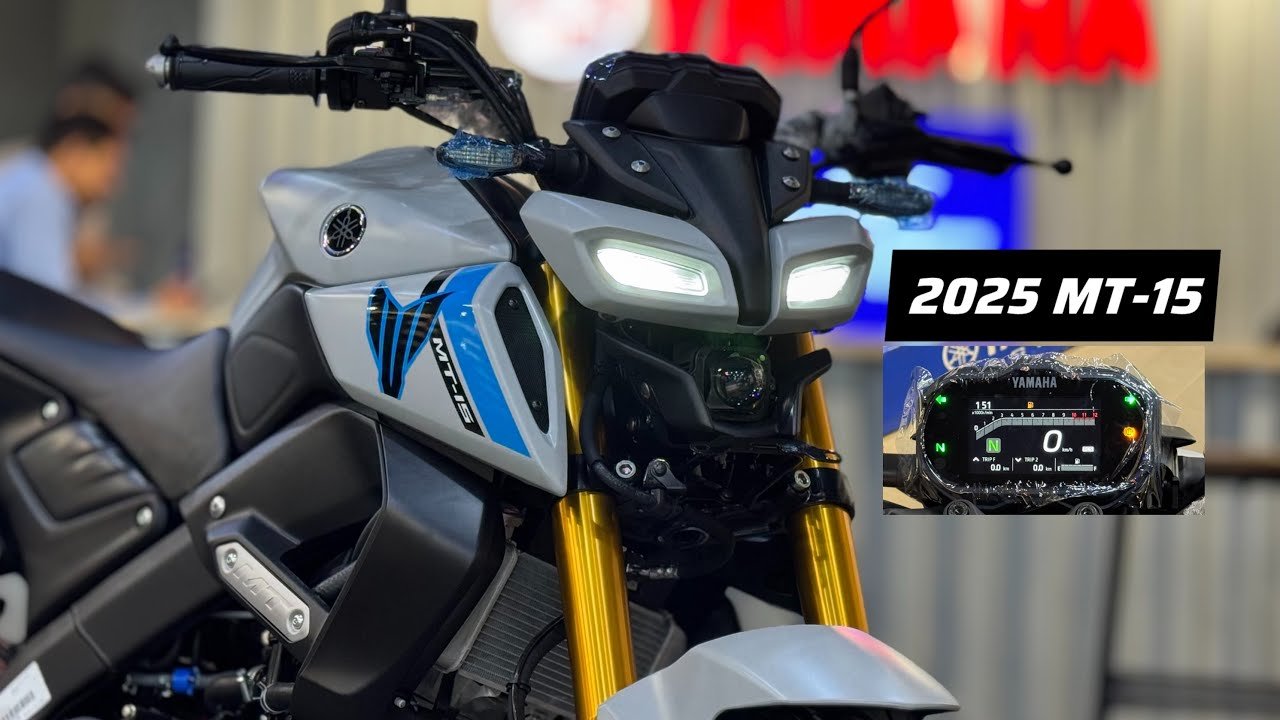The Yamaha MT 15 Version 2.0 (2025), launched in India around July-August 2025, is an updated streetfighter motorcycle in the 150cc segment, blending aggressive styling, agile performance, and modern features. Priced between ₹1.69-1.80 lakh (ex-showroom), it targets young riders and urban commuters, competing with the KTM 125 Duke, TVS Apache RTR 200 4V, and Bajaj Pulsar N250. Built on a Deltabox chassis, it introduces a new TFT display and vibrant colors, enhancing its appeal. This review details its price, specifications, features, and performance in India as of August 31, 2025.
Aggressive and Sporty Design
The Yamaha MT 15 2025 retains its sharp, muscular look with a robotic LED projector headlamp, twin LED DRLs, and a muscular fuel tank with extensions. Measuring 2015 mm long, 800 mm wide, 1070 mm high, with a 1325 mm wheelbase and 170 mm ground clearance, it weighs 139 kg (kerb), ensuring nimble handling. Available in Metallic Black, Metallic Silver Cyan, Vivid Violet Metallic, Ice Storm, Cyan Storm DLX, and Ice Fluo-Vermillion DLX, it features 17-inch alloy wheels with 100/80 front and 140/70 radial rear tubeless tyres. The gold-finished 37mm USD forks and aluminum swingarm add premium aesthetics, though the small tail section and pillion seat limit long-ride comfort compared to the Bajaj Pulsar N250.

Tech-Enhanced Cockpit
The 4.2-inch full-color TFT display (DLX variant) offers turn-by-turn navigation, Bluetooth connectivity via the Y-Connect app, and alerts for calls, SMS, battery status, and maintenance. Features include trip distance, average speed, last parked location, and malfunction notifications. Standard variants retain a negative LCD console with speed, tachometer, gear position, and VVA indicators. While the TFT enhances functionality, it lacks the flashiness of the KTM 125 Duke’s cluster, and the LCD variant may feel dated for tech-savvy riders.
Spirited Performance
Powered by a 155cc liquid-cooled, 4-stroke, SOHC, 4-valve, single-cylinder engine with Variable Valve Actuation (VVA), it delivers 18.4 PS (13.5 kW) at 10,000 rpm and 14.1 Nm at 7,500 rpm, paired with a 6-speed gearbox and assist-and-slipper clutch. The BS6 Phase 2-compliant engine ensures smooth power delivery, achieving 0-60 kmph in ~3.8 seconds and a top speed of ~130 kmph. Claimed mileage is 52-56.87 kmpl (real-world: ~45-50 kmpl), offering a 450-500 km range with a 10-litre fuel tank, saving ~₹10,000-12,000 annually at ₹100/litre fuel compared to a 10 kmpl vehicle. The 37mm USD front forks and Monocross rear monoshock provide agile handling, though the stiff suspension may feel harsh on rough roads.
Safety and Braking
Equipped with dual-channel ABS, a 282 mm front disc, and a 220 mm rear disc, it ensures confident braking. The traction control system (TCS), rare in the sub-160cc segment, minimizes wheelspin, enhancing safety on slippery surfaces. A side-stand engine cut-off switch adds practicality. However, ABS intervention is minimal, and the lack of adjustable suspension limits customization compared to the TVS Apache RTR 200 4V.
Pricing and Availability
Priced at ₹1.69 lakh (Standard) to ₹1.80 lakh (DLX) (ex-showroom), on-road prices in Delhi are ₹1.90-2.05 lakh, including RTO (~₹13,500-14,400) and insurance (~₹8,000-10,000). Available in Standard, DLX, and MotoGP Edition variants, it can be booked at Yamaha dealerships, Flipkart, or Yamaha’s e-shop with a ₹2,000 token. Offers include ₹5,000 festive discounts, ₹2,000 exchange bonuses, and EMI options (~₹3,500/month at 8.5% interest, ₹20,000 down payment). Maintenance costs are ~₹1,500-2,000 every 10,000 km, supported by Yamaha’s 1,000+ service centers. Delivery wait times range from 10 days to 1.5 months, depending on city and variant, with high demand for DLX colors.
User Feedback and Drawbacks
Users praise the head-turning design, peppy engine, excellent mileage (45-50 kmpl in city conditions), and agile handling for urban commuting. The TFT display and traction control appeal to younger riders, while the low maintenance suits budget-conscious buyers. Drawbacks include:
- Uncomfortable pillion seat for long rides.
- Stiff suspension on rough roads.
- Limited service center responsiveness in some areas.
- No quick-shifter in standard variants, unlike some rivals.
- Vibration issues at high speeds or in city traffic.
Comparison with Competitors
The Yamaha MT 15 2025 competes with:
- KTM 125 Duke (₹1.81 lakh, 124.7cc, 14.5 PS, 44 kmpl): Sportier, but less feature-rich.
- TVS Apache RTR 200 4V (₹1.47 lakh, 197.75cc, 20.8 PS, 37 kmpl): More powerful, but less efficient.
- Bajaj Pulsar N250 (₹1.51 lakh, 249cc, 24.1 PS, 35 kmpl): Higher power, but heavier and less agile.
It excels in mileage and tech but lags in pillion comfort and suspension refinement.
Final Thoughts
The Yamaha MT 15 2025, priced at ₹1.69-1.80 lakh, offers a 155cc VVA engine, 45-50 kmpl mileage, dual-channel ABS, and a new TFT display, making it ideal for young urban riders seeking style and performance. Its agile handling and modern features shine, though the stiff ride and small pillion seat are drawbacks. Backed by Yamaha’s service network, it’s a compelling choice in India’s 150cc streetfighter segment.

Leave a Reply